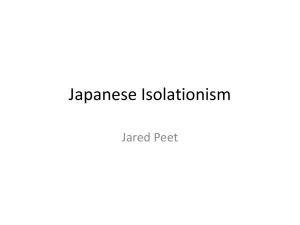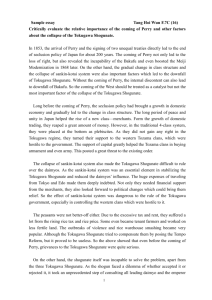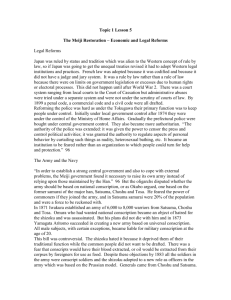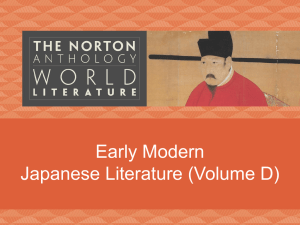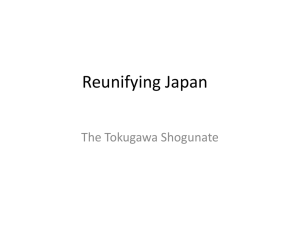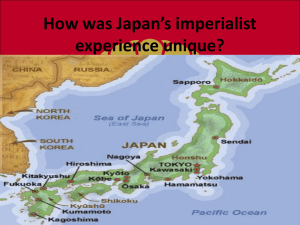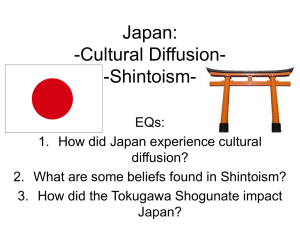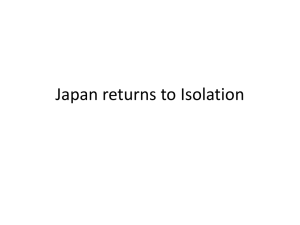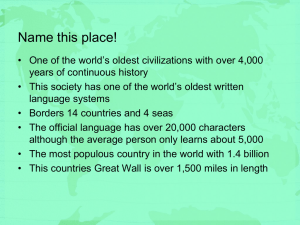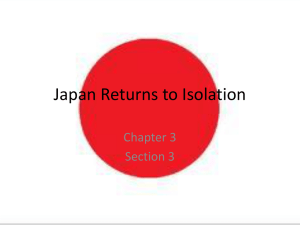The Fall of The Tokugawa Shogunate
advertisement
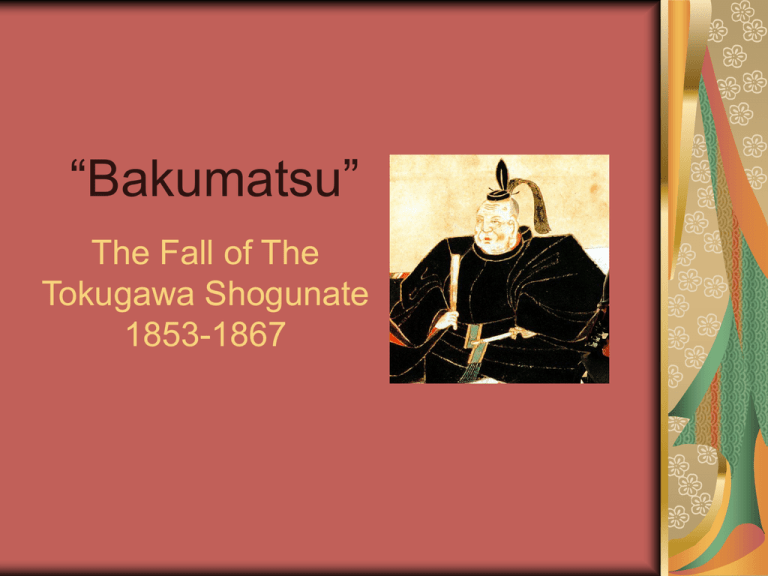
“Bakumatsu” The Fall of The Tokugawa Shogunate 1853-1867 The Arrival of Cmdr Perry July 1853 Designed to Intimidate Black Ships Western Technology Curiosity on both sides Delivered president Fillmore’s Letter Return of Cmdr Perry Signed Treaty of Kanagawa Trade Diplomacy Aid to Victims of Shipwreck Treaties with the Dutch, French and Britain followed Yoshida Shoin Famous Teacher Tried to learn the secrets of Western Superiority Mentor to Ito Hirobumi Led Choshu rebellion Executed by the Bakufu in 1859 Revered as one of the fathers of Modern Japan Sonno Joi! Many Japanese were Xenophobic and resented Western Presence Many Clans began to lose faith in the Bakufu and its ability to stand up to the more powerful West Extra-Territoriality They instead put their faith in the Emperor Began a new movement“Revere The Emperor, Expel The Barbarian” – “Sonno Joi” Emperor Komei Extra-Territoriality Extra-territoriality was a problem for many Japanese Extra-territoriality meant that Foreigners could not be tried under Japanese law. Many Clans such as the Satsuma and Choshu Clans ignored extraterritoriality to their Peril. Rebellions In 1863 the Emperor issued an “Order to expel the Barbarians” Many Disgruntled Samurai began killing westerners They also began to defy the authority of the Shogunate The Richardson Affair/Namagumi Incident Charles Lennox Richardson was a British Trader In September 1862 he refused to bow to a local Satsuma Daimyo Samurai attacked and killed him Led to the bombardment of Kagoshima The Bombardment of Shimonoseki June 1863 Choshu fired on US ships Closed the narrow Shimonoseki Strait for over a year September 1864 British, French and Dutch Warships and Ground forces retaliated and Decimated the Town of Shimonoseki Choshu/Satsuma Alliance 1864 clashes with westerners convinced Choshu and Satsuma clans of the need to modernise. 1866, Satcho Alliance Between two staunch imperial loyalist Clans At first, secret. Later, Overt. Intelligence gathering The Bakufu sent abroad many representatives to learn the ways of the west. Many representatives of Choshu and Satsuma also travelled to Europe and America. They studied western systems of Government, Military, Law and Education. Pressure on Shogun 1860-1865 the Bakufu struggled to control the Daimyo In 1866 it launched a military campaign to crush resistance It was denied success by the Satcho Alliance The shogunate became increasingly impotent In December 1867, Emporer Komei died and was succeeded by his 16 year old son (Meiji) The new Emperor was heavily influenced by the Satcho alliance 1867 Shogun Cedes Power In 1867 the Satcho alliance began to attack the Shogunate Forces in Edo Satcho also moved on Kyoto and directly pressured the Emperor to strip the Tokugawa Shogunate of power In late 1867 the Tokugawa gave up power for the sake of Stability Main Points to Remember: “Bakumatsu” is the name given to the period 18531867 The arrival of westerners in 1853 brought instability “Sonno Joi” - “Revere the Emperor, Expel the Barbarian” became a catchcry for those who resented Tokugawa rule Violence aimed at westerners (Richardson Affair) led to severe consequences such as the bombardments of Kagoshima and Shimonoseki Such defeats led to the realisation of the need to modernise Intelligence gathering missions were sent to western countries Satsuma and Choshu clans formed the Satcho alliance Satcho alliance forced the Tokugawa shogunate to cede power in late 1867 Bibliography Fewster, Stuart & Gorton, Tony. “Japan: From Shogun to Superstate” Brooks Waterloo, Victoria,1988. www.wikipedia.org http://www.jref.com/ http://ocw.mit.edu/ans7870/21f/21f.027j/ menu/index.html Questions for Test What is the name given to the period 18531867? What does “Sonno Joi” mean? Name some of the catalysts for the Bombardments of Shimonoseki and Kagoshima. What was the Satcho Alliance? Why were missions sent to western countries? When did the Tokugawa Shogunate cede power and to whom? Subjects to cover Boshin War Military Reforms Education Reforms Genro Satsuma Rebellion Sino-Japanese War 1894 Zaibatsu Russo-Japanese War WW1 Taisho Democracy Tokyo Earthquake 1923
